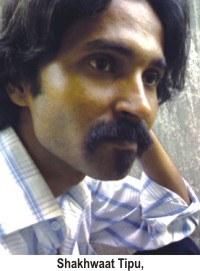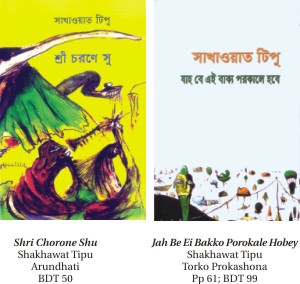|
Book Review
Playing with Language
Ahmede Hussain
 The themes that Shakhwaat Tipu, one of the foremost poets of his generation, deals with are fundamentally Post-modern in nature. As both his collections suggest, his work is littered with the mastery of the language, with which he plays as a juggler might with his clubs. He creates images, gives new meanings to it, only to break the signs and symbols that society or the dominant culture imposes on them. In the broadest sense of the phrase, Tipu's poems are subversive in nature, even though not overtly so. Take Shri, which in Bangla is a way of salutation: Shu is also the same, but is only used for the feminine gender. Interestingly there is a gender-neutral Bangla word, which goes thus: Shrichoroneshu. But splitting them into three, as Tipu does in the title of his second collection, changes the meaning, which is the woman at the man's feet.
 The tone, not nature, of his poems are swayed by the poets of the middle ages, where the approach is more direct, colloquial, and natural. What makes him even more interesting is the way he plays with the language, especially the structure of it. There is something special about Bangla, which changes its structure in every 20 miles; trying to create a monolithic flat language will not work on this delta-- Tipu's poems are a testimony to that. But unlike his peers, for some of whom playing with words is everything they have to offer, Tipu's poems take us to a different level, a world in which myth and reality intermingle. He shuns false myth, myth that our collective consciousness creates when it cannot interpret reality. But make no mistake, he neither is dealing in myth, nor in any urban myth so to speak. His realm is eerily similar to Shri Choitonno Dev and Lalon, a lyrical ballad that refuses to confine itself to the mere boundary of poetry. The tone, not nature, of his poems are swayed by the poets of the middle ages, where the approach is more direct, colloquial, and natural. What makes him even more interesting is the way he plays with the language, especially the structure of it. There is something special about Bangla, which changes its structure in every 20 miles; trying to create a monolithic flat language will not work on this delta-- Tipu's poems are a testimony to that. But unlike his peers, for some of whom playing with words is everything they have to offer, Tipu's poems take us to a different level, a world in which myth and reality intermingle. He shuns false myth, myth that our collective consciousness creates when it cannot interpret reality. But make no mistake, he neither is dealing in myth, nor in any urban myth so to speak. His realm is eerily similar to Shri Choitonno Dev and Lalon, a lyrical ballad that refuses to confine itself to the mere boundary of poetry.
His work defies the Bhoktibad of mystics though, for he raises questions, a skeptic about almost everything. From Derrida to Raja Ram Mohan Roy, important literary figures become objects of his close scrutiny. For the poet creates layer upon layer of ambiguity, it will be difficult to tell the real Ram Mohan from his counterpart in Tipu's work. Read:
Atol Bagane Potol Tulia Kural Khunti Daa
Kahader boma toma nai achen Derrida
(Kicking the bucket in that great garden-- axe, machete, iron spatula Those who don't have bombs or guns have Derrida).
Tipu, as a poet, should be admired and encouraged; one only hopes that, next time, his muse will endow him with an illumination that has a keener vision.
Copyright
(R) thedailystar.net 2008 |
